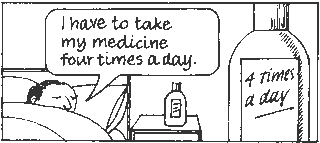Unit 29. have to …
 |
I have to do something = it is necessary for me to do it, I am obliged to do it:
|
- I'll be late for work tomorrow. I have to go to the dentist.
- Jill starts work at 7.00, so she has to get up at 6.00.
- You have to pass a test before you can get a driving licence.
The past (yesterday / last week etc.) is had to …:
- I was late for work yesterday. I had to go to the dentist.
- There was no bus, so we had to walk home.
In questions and negatives we use do/does (present) and did (past):
present
| do does |
I/ we/ you/ they he/ she/ it |
have to …? | I/ we/ you/ they he/ she/ it |
don't doesn't |
have to … |
past
| did | I/ we/ you/ they he/ she/ it |
have to …? | I/ we/ you/ they he/ she/ it |
didn't have to … |
- What time do you have to get up tomorrow morning?
- Does Jill have to work on Saturdays?
- Why did they have to leave the party early?
I don't have to do (something) = it is not necessary to do it:
- I'm not working tomorrow, so I don't have to get up early.
- lan doesn't have to work very hard. He's got an easy job.
- We didn't have to wait very long. The bus soon came.
have to and must (see Unit 27 must)
Use must when you say what you think is necessary, when you are giving your opinion. Usually, have to is also possible:
- It's a fantastic film. You must see it. (or You have to see it)
Use have to (not must) when you are not giving your personal opinion:
- Jill won't be here this afternoon. She has to go to the doctor. (This is not my opinion - it is a fact. )
- In many countries, men have to do military service. (This is not my opinion - it is the law in those countries.) хостинг для сайтов © Langust Agency 1999-2024, ссылка на сайт обязательна
![агентство Лангуст [переход на главную] Агентство Лангуст [переход на главную]](/pic/logo.gif)

